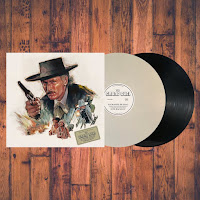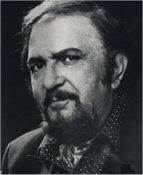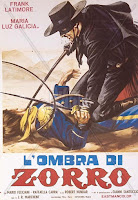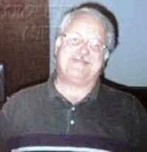“As an actor that happened to be Native American, I had
to sit on the sidelines for a long time, waiting for something like this”
The Up Coming
By Sarah Bradbury
December 15, 2022
The English is the new miniseries from
writer-director Hugo Blick (The Honourable Woman, Black Earth
Rising), which first premiered at this year’s London Film Festival and has
now landed on BBC iPlayer. It follows Cornelia Locke (Emily Blunt), who tumbles
into the Wild West looking for vengeance for the death of her son and becomes
an unlikely travelling companion of Eli Whipp, a member of the Pawnee Nation
and former cavalry scout who has enemies on both sides.
Both invoking and playing upon the tropes of
a Western, there’s much to admire in the series’ breathtaking cinematography
and references to the rich history of films from the Golden Age of the genre,
from John Ford to Sergio Leone’s Spaghetti Westerns. Stunningly executed yet
still boldly violent and bloody, it walks a tightrope between being very
stylised yet also viscerally involving. Beyond the vast, dusty landscapes, rich
textures, colours, costumes and brazen brutality, though, it’s the performances
and shared chemistry between Blunt and Spencer as Locke and Whipp that cut
through the tension built by Hick with sizzling electricity to keep viewers
hooked. Both are endlessly watchable in their roles, delivering the to-and-fro
of their dialogue with wit and panache and bringing a delicious push-and-pull
factor to their character’s interactions, like magnets attracting and repelling
one another, each one both drawn to but unsure if they can trust the other.
The Upcoming had the pleasure of speaking
with Spencer about his own love of Westerns growing up, how contemporary issues
also infused his character and how phenomenal it was to work with Blunt. He
also shared how the story can have relevance to our own destabilised world
today and that, as a Native American actor, he’s often had to wait in the
sidelines – until now.
Hi Chaske, lovely to meet you, For those
who haven’t had a chance to watch it yet, what can they expect from The
English?
A lot of action, a lot of adventure, a lot of
Wild West, a lot of horses and probably some tears – bring some handkerchiefs!
It’s very much within the Western genre,
but it’s also playing with its tropes and bringing something fresh. What stood
out for you when you read Hugo’s script?
When I read it, I felt very excited to start
filming. And the layers of Eli… I was blown away by how many layers this
character had, he’s just so multi-faceted, he just fascinated me. And when I
read it, actually, I knew I could do the role, but it also scared me too,
because, “Can I? Can I do this shit? I hope so…”. But Hugo had laid the groundwork
and the roadmap; he’d given me a lot of the information and where he wanted to
go in – movies that inspired him as a kid watching Westerns. And once I got
into that world – his world, The English world – it was very easy. I
grew up with Westerns. I’ve seen a lot of Westerns and a lot of people have,
they’re just a fun genre, so I knew exactly where to pull from. I knew what he
was talking about.
How did you see the character of Eli? He
doesn’t say much, but it’s clear there’s so much going on underneath that
restrained nature. In some ways, that must be more challenging to play than
when you have a lot of words to work with. How did you figure out who he was
and how to portray him?
Well, I took all the information from the
history, so that helped me out a lot. But at the end of the day, I had to make
it my own. As a child, I grew up with a lot of vets – Vietnam vets and stuff –
from the baby boomer generation. So I grew up with a lot of guys like that.
Plus, I knew some vets who had gone over to Afghanistan and was fortunate
enough to meet and talk with them in my past. And I just pulled from that,
because I can only take history so far. And that’s where I started making it my
own. And I just kept seeing him as an ex-Vietnam biker, strolling through the
West on his Harley Davidson, listening to Creedence Clearwater Revival. That’s
how I felt he was. I know it doesn’t really apply to what Eli is, but that’s
what I brought in, because that’s how I felt he was and I felt like he should
have those restraints. And, also, it’s a double-edged sword with that type of
character because, obviously, I’m a pretty animated guy! So I had to tone it
down a lot. But it was also comforting to know that I had a limit; I have a
little area that I can’t go out of. When I work, usually the first couple of
weeks, I’m nervous: I’m trying to figure out everyone’s working style, the
director, my costar – we’re just trying to figure everything out. And I’m
usually in character a lot during those [weeks] from the beginning. But once I
get that pattern down, and when I feel comfortable, then I can kind of play
around with it. And I would say that it didn’t take me that long to find that
character once we started filming, because we’d been prepping for so long, and
I had this guy down months before. I’d even say during the audition – I kind of
knew where he was just from the breakdowns – so when I went in to audition it
felt very comforting to have that restraint, in a way. It was a fun character
to play. I mean, he’s the ultimate badass, you know? I wish I could be that!
But it’s fun to pretend to be.
Emily is one of these extraordinary
actresses who could so easily have been typecast but continues to choose
fascinating roles and make them her own. And there’s so much chemistry between
you two on screen, particularly the scenes where you have this amazing
dialogue. What was it like working with her? Did having an extended rehearsal
period help to make sure that chemistry was there?
Oh God, working with her was phenomenal. I loved
working with her, really, she was so much fun. I’d known Emily Blunt’s work
before I got to meet her, and I’m a fan of a lot of her movies. I really liked
her work in The Girl on the Train. I was working on another film years
ago, and I went to go see that by myself, and she blew me away. I think I was
on Woman Walks Ahead, and I ended up talking with one of the actors
about it, saying, “It’s phenomenal, just watching that movie blew me away”. And
then finally getting to meet her and working with her – it was the best. What
I’ve always admired about her is that she could easily take the road less
travelled. And yet she doesn’t. To me, she’s like this character actor trapped
in this leading actress’s body; she finds these characters, and she just gets
them. And, with Cornelia, watching her work and watching her piece it together
– I definitely took a lot of tips, I never told her that, but I definitely
watched her enough to where I could say, “Okay, I see how she’s doing this, I’m
going to steal that, I got to steal that from her”. She was so supportive. And
the chemistry – it’s great when you work with nice people, who are just
about the work, and you still have fun. And I think our chemistry had a lot to
do with just knowing we had these amazing characters and knew what the stakes
were with them. Because if we just phoned it in, you would see it, and it would
be horrible. So, working with her, I liked it because she ups the game. And
working alongside her – I’ve never had an easier job. You’re talking about what
you had for dinner, where you went out to dinner the other night with your
friends, and you just go right into dialogue, and I like that. Because I’ve
been on projects where I’ve had to maintain my energy to stay in that
character. I’m not a method actor, but to try to keep in that vicinity. With
this, it was already there because we worked and rehearsed so much that we
could turn it on really quick. And it was fun – it made it fun. It was just
little ideas and things we threw at each other about doing some of those
scenes. When I got the job, we talked a lot about our own lives and where we
could relate to our families, movies we liked, working on The English
and what we brought to the table and how we figured these characters out. I
love working with people like that because it gets down to almost like math –
it’s kind of mathematical, placing everything where it should be. And at the
end of the day, when you finish some amazing scenes with your scene partner,
you feel really good. You want to go home with a happy smile on your face – or
it depends on the scene: if we did something really sad, you go home and have
some tequila I guess!
Like many period pieces, the show hits on
issues that remain relevant today, such as dimensions of race, of identity.
And, in the case of your character, perhaps those are not accepted by either
the country they’re living in, nor by their own community. Would you say a lot
of people will relate to in the series, despite it not being set today?
I think so too. I want to tread really lightly on
this part, but I would say that The English, to me, reflects today’s
instability and that, really, you don’t know what’s going to happen. In a
Western, it’s very brutal, and there’s no certainty and – I don’t think it’s
just my country, I think it’s happening all over the world – we’re in a place
of uncertainty, and it’s quite terrifying, actually, if you really think about
it. I don’t want to bring a big cloud over, like you should watch The
English and think of that, but I think the audience could relate to the
scary part of a Western, the instability, the you don’t know if you’re gonna
make it to tomorrow. I don’t know if we’re exactly there in the world, but I
know we’re in pretty scary times of, “I don’t know what’s gonna happen: what’s gonna
happen over in Ukraine, what’s gonna happen here in this country”. Anything
could happen, and it’s quite unnerving and it can be anxiety-inducing. I think The
English kind of captures that – the instability of that, of just not
knowing what’s going to happen tomorrow. And I think that we in this world are
kind of there right now. And I hope things work out, because we got a good
thing going; this place is pretty amazing. And I’m not just talking about the
country, I’m talking about the world right now – we could blow it if we’re not
careful.
Each scene, if you paused it, could be a
photograph – the aesthetics are just incredible. However, it doesn’t shy away
from brutality either, straddling this place between being very stylised, but
also being very engaging and visceral. What was it like working on these sets?
And when you watched the final product, did the way it looked really strike
you?
Oh, yeah, it always strikes me because, when I
see what I read on the page, it’s never what I think about on the screen. In
fact, I’m always blown away when I see the end product. I knew it was going to
be gorgeous, just because of the locations we were shooting in and the time of
day we were shooting. And when I finally saw it all piece together – it’s
beautiful. I saw it on the little screen because they sent it to me, because I
had to watch it all before we started going to press. But when I saw it on the
big screen… I think it should be seen on the big screen. It’s such a beautiful
movie. That first opening shot in the hotel when we first meet Cordelia and
Eli’s tied up – it’s just gorgeous. It’s like out of George Stevens’s Giant,
or John Ford. You see a lot of that in the cinematography. I could tell when we
were shooting, I knew it was gonna be beautiful, but I didn’t know how
beautiful it was gonna be. They blew me away.
It plays with a genre that has a long
history to create something fresh, and one of the things that stands out is the
casting and particularly the inclusion of Native Americans, who, in the past, were
overlooked. In what ways does this take on the genre feel more contemporary?
You know, I’m not the first Native actor that’s
done a lead role like this – there are a few of them, but it’s pretty rare.
It’s rare. For years, as an actor that happened to be Native American, I had to
sit on the sidelines for a long time, waiting for something like this. And,
finally, a character comes out like Eli in The English. I knew it was
an homage to the Westerns of before, to the Man With No Name in the A Fist
Full of Dollars to Paul Newman in Hombre, Charles Bronson in Once
Upon a Time in the West. I could see in Butch Cassidy and Sundance Kid
– I could see where the blueprint was being made for this character. So it
was a fun character to play. It’s just like when I was a kid, going out in my
backyard and playing cops and robbers and cowboys and Indians. That’s all it
was. I think I leaned over to Hugo and said, “We’re like kids who get really
expensive toys. But we never leave the sandbox, you know?” We’re just there,
and that’s fine. It’s fun to work with my kind of people. We’re just big kids
with big toys. And we’re here to entertain.
Was there an aspect that you loved the
most? You were already au fait with riding a horse
but there was a lot of that, then there were the costumes, the hair…
Well, right when I put on the wardrobe and they
shaved my head, I really became Eli. We were in wardrobe fitting, my head was
shaved, then we put the big coat on and, oh my God, my walk changed, my voice
dropped – I became Eli right then and there. It’s like, “I know this guy”. It
helps when you get the wardrobe. And right before we’d go on set, I would get
hair and makeup and get all set up, and I would blast Creedence Clearwater
Revival or Bruce Springsteen just to get in that Americana mode, and it just
changed everything. Music really does affect how I work as an actor. Like I
said, my walk changes, my voice drops a little bit – that’s what I love about
doing roles like this. I wish I was like him!
Finally, can you tell us what you might
be working on next? ,
I’m working on Marvel’s Echo. That
should be out next summer. I hope people see it, I really enjoyed working on
that film too. And all I can say is that my character is a disco guy…
Sound like quite a contrast! Thank you so
much for your time.






.jpg)












.jpg)















.jpg)






















